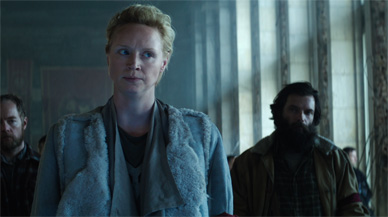Movie Review: The Hunger Games: Mockingjay Part 2
By Ben Gruchow
November 27, 2015
This film is fairly merciless when it comes to illustrating who pays for war, and at what consolation. It ends on a faint note of hope that barely compensates for two preceding hours of suffering and tension, which occasionally erupt into grim violence. It’s important here to clarify the difference between violence and gore; gore is a special effect, and violence relates to tone and mood and behavior. The Hunger Games: Mockingjay Part 2 is very violent, possibly the most violent PG-13-rated film I’ve seen; when it’s not violent, it’s elegiac. It’s as downbeat as any entry of a massively-popular tentpole franchise that I can remember.
The only reason I can think of as to why it got away with the rating it did is because the violence is explicitly in service of a story and theme that weights it in a dramatically sound way, and Mockingjay Part 2 is undeniably effective as a thriller because of this. The Hunger Games story ends as it should; a fireworks-laden, show-stopping battle royale (no pun intended) would have done the material and themes built up a great disservice. The first film, in 2012, hesitantly nudged around the darker implications of its world and was content with maintaining a blank, straight face about them when they came into play.
The Games themselves functioned as the main draw for Capitol citizens and movie audiences alike, and they were the most traditional and disposable parts of the first two films. This final entry - and really, Part 1 as well - stays away from easy motivations or pat resolutions, with the caveat that neither film (nor the series as a whole) is terrifically complex. The core of this entire story’s strength (to this reviewer, at least) relates to how easily a population is inspired or cowed (or both) by media narrative, and how fluid that line can be. It’s not rocket science, but it’s just as relevant and unsettling a concept now, perhaps more so, as it was when the first film came out.
At the very least, this causes the film to play in two separate ways. Those audiences for whom the Games and reality-show satire were the principal draw in 2012 and 2013 are likely to be nonplussed or put off by this film and the one before it, which goes some distance toward explaining the drop-off in domestic earnings for both the Mockingjay films. The focus remains resolutely on Katniss, as it did for the first two movies, but the storyline around her has shifted entirely to reflect an unpleasant reality where there are far fewer acts of heroism and decision than there are meticulously staged and rehearsed impressions of heroism and decision.
This is explored in a rather skeletal fashion, but it’s a legitimate extension of Part 1’s approach to developing Katniss into an inspirational, mythic figure (although one that’s cynical as all hell), and Part 1 was really an elaboration on Catching Fire’s ultimate message that fame, celebrity, and hero worship hold only as much weight as the population is led to believe. It’s thoughtful and intelligent in a satisfying way, and people who have been responding to this narrative’s progression throughout the series will not be disappointed.
Continued:
1
2




